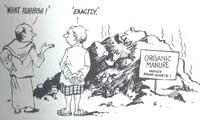Benefitting twice over
Benefitting twice over

IN TAMIL Nadu, some municipal corporations have begun to sell organic manure to farmers. This not only solves the problem of waste disposal but also supplements their budgets. In 1992-93, the Thanjavur municipal corporation sold 11,790 tonnes of organic manure for Rs 1.69 lakh.
The manure consists largely of wastes from slaughter houses and vegetable markets, besides domestic waste. And, along with the elements of sound business practice and organic farming present in this operation is a dose of good old superstition: A dead dog is put on every heap of garbage because it is believed this helps accelerate decomposition.
However, in most cases, the manure is not decomposed properly. T Anbazakan, Thanjavur's municipal health officer, says this is because of untrained sanitary inspectors and the huge demand from the farmers, who don't wait for the waste to decompose properly. Glass and metal pieces in the compost can hurt farmers and their animals.
Says V Govindaraju Thajirayer, a farmer of Kovilur district who has used municipal-supplied compost for the last decade, "Most farmers employ labourers to remove the glass, but even then pieces remain and cause injuries." But N Thirunavukarasu, a sanitary inspector in Thanjavur municipality, alleges, "Farmers exert political pressure to buy compost and as a result, we are forced to sell semi-decomposed heaps."
Though Thanjavur municipality has got the state award for best compost management thrice, it hardly spends anything on the people who collect the waste and prepare the compost heaps. P Seperumal, a municipality scavenger, says, "We are supposed to be given gloves to protect us from glass and metal shards but we have never seen them. Oil and soap are supposed to be provided once a month, but we get them only once in six months, if at all."
Asked to comment, junior officials make the usual excuses of shortages of funds and look away in embarrassment and municipal commissioner S Meiayazakan simply says, "No comment."







